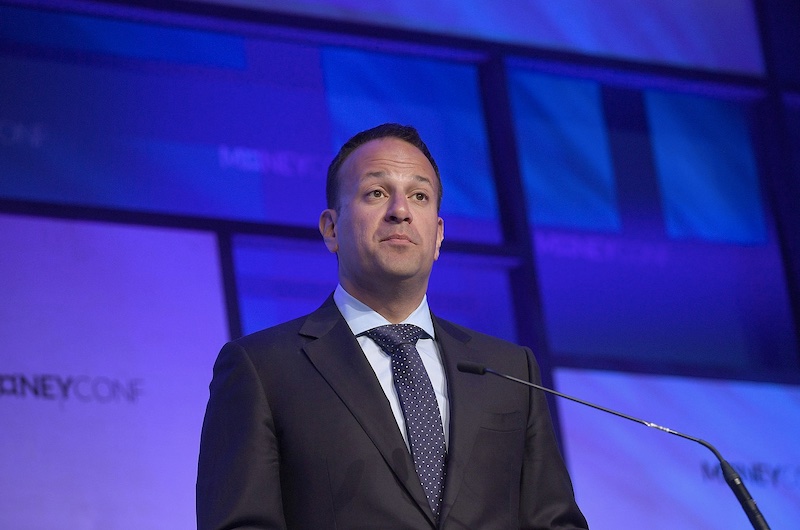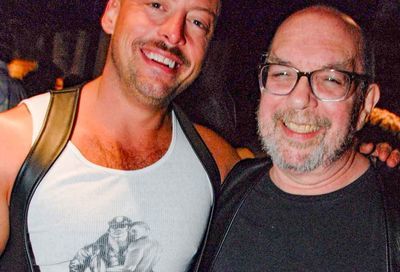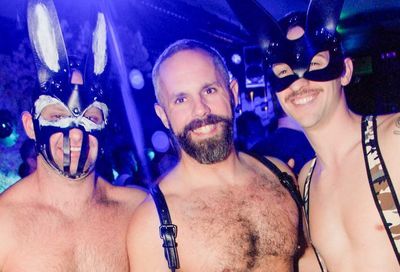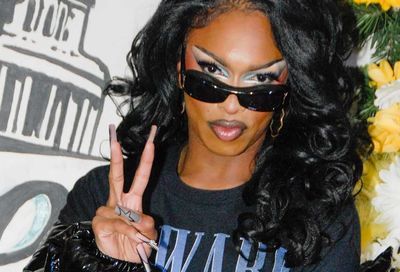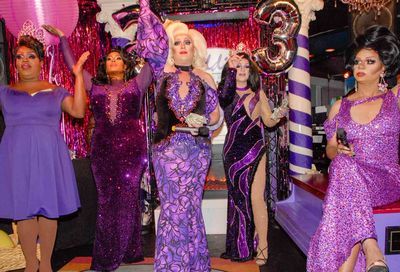Man in the Middle
Jonathan Capehart charts his own course as one of Washington's leading opinion-makers
Interview by Sean Bugg
Photography by Todd Franson
November 4, 2010
As a young boy in New Jersey, just about yay-tall, Jonathan Capehart knew exactly what he wanted to be when he grew up: a television journalist.
”Or, as I would say then, a news commentator,” he laughs.
His young eyes were set on the exciting and somewhat exotic post of a network correspondent in Moscow, the place of intrigue and secrecy behind the Iron Curtain. A post worthy of a young boy who pre-teen passion for politics had made him a ”complete nerd. Complete and total nerd.”
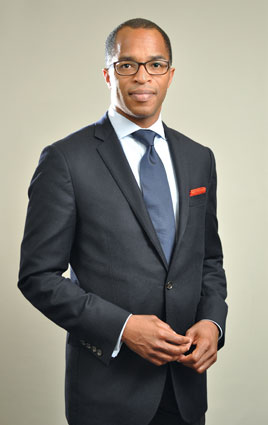
Jonathan Capehart
Flash forward a couple of decades, when the Iron Curtain has drawn back and television news has metastasized across the cable landscape, and the young Capehart is pursuing his dream by working as a researcher on NBC’s Today show. Then he gets a call from a New York paper looking to add fresh young voices to its editorial page. He took a chance at a career change and found himself on the editorial board of the New York Daily News, where he won a Pulitzer Prize for the paper’s editorial campaign to save Harlem’s Apollo Theater and, in 2002, became deputy editor.
While Capehart laughs that his career path was ”a fluke,” it was no fluke that brought him to the editorial page of the Washington Post, where his opinion writing has made him one of the nation’s most prominent gay editorialists. He writes daily for the paper’s ”Post Partisan” blog and, in work that hearkens back to his youthful career dreams, appears regularly as a contributor on MSNBC.
”It’s work, for sure, but it’s fun,” he says. ”It’s sort of like being the kid who wanted to be a fireman and became an investment banker but is a volunteer firefighter on the weekends.”
Capehart is deep in the political fray, frequently writing on the politics of ”Don’t Ask, Don’t Tell,” as well as the Tea Party movement and the ”target-rich environment” of Sarah Palin.
Looking at those and other political debates, he thinks of himself as a man firmly in the middle, eager to challenge ideas and arguments from both sides of the spectrum, even if those challenges sometimes lead to some misperceptions of his own politics.
”I’m not a conservative, but I’m not a wild-eyed liberal either,” he says in an interview conducted a few days prior to the Nov. 2 midterm elections. ”I am firmly in the middle and I think that’s where most people are. The people who are firmly in the middle don’t have very many people who can speak for them, depending on the issue. For all the horrific e-mails I get, the ones that pop in that say, ‘I just want to thank you for what you said,’ those mean the world to me.’
METRO WEEKLY: To start out, what’s a day in the life of an editorial writer? Is it just consuming and thinking about a lot of information, and discussing that information?
JONATHAN CAPEHART: It’s all of that. I’ve never been a news side reporter, but we do the same things that news side reporters do: We have our sources, we make phone calls, we do our own reporting. We don’t just sit at a desk and spout off. We actually talk to people.
Right now, I’m writing primarily for our Post Partisan blog, which is a lot of fun because I can get up in the morning and think, ”Sarah Palin did what?” and just start writing. Because it’s the Web, you’re constantly writing. By the time we sit at the table for the editorial board meeting at 10 o’clock, I usually have written something already that is either waiting to go up or is already up. It’s a certain sense of accomplishment but that means I’ve been awake for a while. [Laughs.]
MW: I know when you write the main editorials in the ”voice of the paper” you write one way, when you write a signed column it’s in another way. How do you describe the difference between Jonathan Capehart the writer and Jonathan Capehart as the voice of the paper?
CAPEHART: When you’re speaking for yourself, you’re freer. Once you are speaking for the institution it’s, ”I am speaking for the paper.” You’ll never see ”I,” it’s always ”we.” I don’t want to sound overly dramatic, but it is a humbling moment when you realize you’re writing, ”We don’t agree with the president’s position on this,” or ”We think that what the minority leader is doing is irresponsible.” You’re speaking for a whole lot of people beyond yourself.
MW: When the editorial board is meeting to discuss issues, are people kind of designated as left wing, right wing, progressive, conservative and so on?
CAPEHART: It’s more split up in terms of people’s issue areas. We have someone who focuses on Maryland, on Virginia, someone who focuses on the District, someone who focuses on the economy. Of course, once you go around the table and put out ideas, that’s when you see the ideological differences. And ideological with a little ”i.” We’re not having ideological battles across the table, no culture wars or anything like that. But people come to the table with different work and life experiences, which inform their opinions, and you have to respect that. Every time we meet it’s like a graduate seminar. I am surrounded by some of the smartest people I have ever worked with.
Only one time in my entire professional career have I worked someplace and felt like I was the smartest person in the room. When I start feeling like that, there’s a problem. There’s a real problem. [Laughs.] That’s not the case here at all. It really is a privilege to sit and listen to these wildly smart people talk about issues from who should be on the school board in a county in Maryland to what the U.S. policy should be in Afghanistan. I don’t want to leave the impression that I’m not contributing to the conversation, because I am. But I know my lane, and I don’t like to talk just for the sake of talking.
MW: What is your lane?
CAPEHART: When I started on the board, I was doing the environment. My editor, Fred Hiatt, asked me to start writing for Post Partisan, and so I’m primarily writing about politics. Also, I am the guy — not the only guy, but primarily the guy — who brings gay issues to the table, African-American issues to the table. If you look at my archives on Post Partisan, you’ll see there’s tons of gay stuff, probably second rank is lots of black stuff. Third probably Tea Party and Sarah Palin, but because there’s just so much material! [Laughs.]
MW: Our identities always inform how we approach things, particularly when a part of your identity is being a minority. Which actually do you think impacts more on your day-to-day work as an opinion writer, being gay or being black?
CAPEHART: I don’t know how to answer that question. I really don’t. Because when I sit at that table it depends on what we’re talking about. If it’s a gay issue, everyone around the table knows that I’m gay, so what I have to say has a certain amount of weight. If it’s an African-American issue, what I have to say has a certain amount of weight. But I don’t walk into the building thinking, ”I’m the black gay man, hear me roar.” That’s not how it works. I’m a journalist first.
MW: Do you feel that the LGBT community expects more out of you because your job happens to be very prominent? It’s not necessarily like you said, ”I’m going to be a leader of the LGBT community,” but by dint of your position you’re kind of put into that role.
CAPEHART: Well, if I’m a ”leader” in the community that’s news to me. [Laughs.] If I’m a prominent member of the community, wow, thanks. But I didn’t go into journalism and I didn’t come to the Washington Post to be a leader in the LGBT community or be a leader in the black community. There are a lot of people who think that because I’m gay or because I’m black I have a responsibility to those respective communities depending on the issue. I feel that my responsibility as a journalist is to tell the truth. And sometimes telling the truth to either the gay community or the black community is really tough for those two communities to take: ”How dare you air our dirty laundry?” or ”How dare you say this, why aren’t you supportive?”
I’ve been smacked around by both communities for 15 years, so I’m so used to it now. I can’t let other people’s expectations get in the way of my doing my job. If someone gay or someone African-American is doing something incredibly dumb or harmful, or illegal, I have a responsibility to say something. I took a lot of hits in New York when I was writing a series of editorials at the Daily News on calling on then-Mayor Rudy Giuliani to close gay movie houses and sex clubs where unsafe sex was happening. Publicly, the vitriol I received was incredible. I got the reputation of being a neocon, people said I was anti-sex and self-loathing and all these things. And, you know, back then I was still sort of new to it and those things hurt. It’s like, you people don’t even know me and you’re saying this.
My mindset changed when over time people would come up to me and they would say, ”I saw the piece you wrote, good work” or ”Thanks, that needed to be said.” And they would always whisper it. That’s when I realized that I’m the guy who pokes his head up out of the foxhole to say something and I’ll take the shots, because there are a bunch of people in the foxhole with me who can’t or won’t. They’ve seen what happens to people who stand on principle and get ripped to shreds. A lot of people don’t want to take that risk, and I don’t blame them.
MW: Speaking of hits, you took some recently for your video interview with Valerie Jarrett about recent teen suicides and she used the term ”lifestyle choices” when talking about a 15-year-old gay teen, and you didn’t challenge her on the use of the term. What was happening there?
CAPEHART: There are a lot of things at work here and I understand the criticism, ”Why didn’t you jump in there, why didn’t you challenge her?” The folks who are asking that question are coming at it from the point of view of activists. My job is not to sit there and say, ”Aha! Bigot! What do you mean by that?” Where I do think they have a reasonably valid point is why didn’t I call the question right then. And yes, when Valerie said that, bells, whistles, alarms, everything went off, and I thought, ”Oh, wow.” But it was ”Oh, wow” in the sense of, ”How could she have made that mistake?” I know that’s not her, she could not possibly have meant it that way. Off on the side was our producer telling me we’ve run out of time. These are supposed to be sort of short interviews, and I knew by then I was already over way over time, and the person who’s saying [motions frantically] is the person who’s going to have to edit this video. So, I just…. I let it go.
When I started seeing the traffic and hearing what people were saying, I then sent Valerie an e-mail asking, ”Do you think that being gay is a ‘lifestyle choice’?” In the piece where I ran her apology, I made a point of saying I know her and I know what’s in her heart to make it clear to people that, you know, people slip up. People make mistakes that are benign, that sometimes can even be explained. Do you know how many times I’ve been on live television and said things that I didn’t mean to put it that way, I didn’t mean to say it that way? Some of the things that were said about her and what that means about the president I found really sort of galling, because they’re trying to turn her use of that phrase into ”Aha, see, he hates us. This proves he doesn’t care about us.” I know everyone’s frustrated and understandably so, but you’re going to go from zero to 60 in a nanosecond. It’s irrational.
MW: You mentioned that you know her comment was benign and not reflective of her true beliefs, because you know her. That’s always seemed to me to be one of the problems — that the journalists who have the access are filtering things one way, but the people who are reading the story don’t know Valerie Jarrett, they don’t instantly know it’s benign. Where’s the line on where language like that should be taken as an alarm that should be followed up on?
CAPEHART: It’s an issue of trust at that point. We’re now in world where no one trusts anyone. My hope is that if I say, look, I know this person, I’ve talked to this person about these issues, I know where their head and heart is at beyond what we’re talking about in this one particular interview — then I’m hoping you will trust me when I say that she’s not an anti-gay bigot. Especially coming three days after she spoke to the Human Rights Campaign dinner about the administration’s concern about suicides and bullying, as well as other things that she has done in the past. I think people are too quick to write off good works and good deeds that have been done. I just think it’s unfortunate that the mistake was made, and she is sorry. But I also think it’s unfortunate that because of that mistake, all the work that the administration is trying to do is now suspect.
MW: Switching over to a subject you’ve written a lot about, the effort to repeal ”Don’t Ask, Don’t Tell,” there are a lot of opinions in the gay community about what’s happening and why. From working with the editorial board, is there a different approach or analysis of the situation outside of the gay community?
CAPEHART: Around that table it’s 100 percent agreement that ”Don’t Ask, Don’t Tell” is a horrendous policy that should be repealed. We are also pretty much in agreement that if you want this repealed, Congress has to do it. It’s an act of Congress, Congress has to repeal it. There are people saying the president should issue a stop-loss order. When the president first came into office, I believe we wrote this editorial saying don’t do that. If you issue a stop-loss it’s a de facto elimination of ”Don’t Ask, Don’t Tell” — the next president can come in and reverse that stop-loss, and you’ve got all of these troops who are at risk.
I’ll just speak for myself because I’ve written so many pieces on this. So much of the conversation is, the president isn’t doing anything, the president doesn’t care, the president’s just sitting idly by, the president’s letting brave soldiers lose their jobs. And not recognizing that the military is a completely different institution, that there are some lessons to be learned from what President Clinton went through in ’93, which is that if you don’t bring the military along, you get screwed. When I learned that the president had at least two Oval Office conversations with Secretary of Defense Robert Gates saying, ”You’ve got to end this policy,” that says something. And he got Gates and [Chairman of the Joint Chiefs of Staff Admiral Mike] Mullen to testify before Congress. I think the president has done just about everything he can do to get ”Don’t Ask, Don’t Tell” right to the edge of being repealed. That’s why I’ve consistently written, yell and scream at the president, chain yourself to the fence if you want to, but if you’re not also yelling and screaming at — and this was before the House passed it — Nancy Pelosi and Harry Reid, you’re crazy. The president said give me a bill, I’ll sign it. But you can’t get a bill unless both the House and Senate pass something.
MW: But wasn’t it that he said give me a bill and I’ll sign it after the military does its study.
CAPEHART: Well, this is what he has been saying consistently from the beginning. The military study was a compromise thing just to get it through, but still, we’re right on the edge of getting the repeal….
MW: [Laughs.]
CAPEHART: Or losing it. Thanks, Harry Reid.
MW: You said that it says something that the president had two meetings in the Oval Office with Robert Gates, but doesn’t it also say something that this schedule was put into place, with a study period that was going to drag past what everybody knew was going to be a difficult midterm election, and putting it into a potentially lame-duck Congress, which is what we have now? So many people in Congress immediately latched on to that, that they couldn’t do anything until the study is done. Doesn’t that say something about the administration’s approach?
CAPEHART: But look, the president’s not a king, he’s a president. If he were King Obama, this would be done. But ”Don’t Ask, Don’t Tell” is an act of Congress and the president has done as much as he can do. I say to folks who complain about the study period, which would you rather have, the study period or no action at all? I don’t think many people appreciate, not how difficult it is to do this, but how complicated it is to do this. We’re talking about changing the policy in an institution that’s all about process and rules and regulations. Folks who think that you can just overnight eliminate this policy and suddenly everything’s going to be okay, that’s not the case. You’ve gotta build the plane before you can fly it.
MW: As a community that’s not particularly politically powerful — we’re a small portion of the overall American community — shouldn’t we be a little mad that on something like DADT repeal, we can’t even move forward on something that Americans pretty solidly support. Shouldn’t we be angry?
CAPEHART: Well, yeah. I’m not saying that people shouldn’t be angry, that people shouldn’t be frustrated. But I want that anger and frustration to be informed anger and frustration. You’ve got folks on the right who are screaming that you’re going to hurt the military or you’re going to do this or that, homosexual agenda, blah blah blah. You have folks on the left who are saying Obama’s a liar, why can’t he just do it. The arguments on the right have already been discredited, so I don’t have to focus on them. The arguments on the left, they’re interesting arguments. They’re good questions. When I saw the Palm Center study about the stop-loss, I read that and I thought, hmmm, interesting. Then I started talking to people about it and I thought, not a good idea, because ultimately he’ll get slammed for ending ”Don’t Ask, Don’t Tell,” so if he’s going to get slammed for it, how about starting the process to actually repeal it. Don’t do this feint. So people should be angry, be frustrated, but know that some of the things that people are calling for ultimately are not good for the community, in the sense of getting to the conclusion we want, but also not good for those troops who everyone says they’re fighting for.
MW: The conventional wisdom is that the political process is broken and it’s nastier than it’s ever been. There have been periods of political nastiness throughout American history — do you feel that we’re in a particularly bad period, or is it the same old ideological wars in different clothing?
CAPEHART: No, it does feel bad. It feels sometimes a little untethered. But politics has always been nasty. When you have politics plus a terrible economy and a nation that’s filled with people who are scared, and understandably so, you get an atmosphere like this. I give the president a lot of credit for trying to rise above a lot of the crap, to get people to find their better angels, but it’s not just liberals fighting conservatives, the right fighting the left. You’ve got intra-party warfare happening on the Republican side and on the Democratic side. The president spends as much time fighting with progressives as he does with Tea Party types and [Senate Minority Leader] Mitch McConnell and all of those folks.
That’s why I like to be the one who’s saying to people on the left, ”I know you’re mad, but, you know, slow your roll a little bit. Step back. Have some perspective.” Sometimes it feels like a lonely job. I mean, I could stake territory on the far left and have people saying, ”Yeah! You’re right!” But who wants that? Especially if that’s not who I am.
MW: I’m going to switch to a completely different topic — what’s your story of how you became aware of being gay?
CAPEHART: Oh, wow. I’ve kind of known since I was 10. Everyone has the story about when they first saw the word or the definition of the word. I was spending the summer with my aunt and uncle in Virginia, and there was some sort of Bible tract around. I remember reading this one part about, you know, man lying down with man and blah blah blah. And I thought, ”Hmmm, well. What’s wrong with that?” That started the beginning of thinking, maybe that’s why I feel different.
MW: Who was your first crush?
CAPEHART: Who was my first crush? I can’t even think. I do know who my first love was. It’s one of those stories where nothing ever came of it, but it was my college best friend, Matthew. It was one of those relationships that everybody hopes for and dreams about where you’re the first conversation in the morning, you’re the last conversation at night, you finish each other’s sentences, you do everything together, you can have entire conversations without saying a word. That was our friendship, and we shared not one kiss, not one intimate moment, nothing. It was purely an affair of the heart.
MW: How did your family deal with it your coming out?
CAPEHART: I came out to my mother when I came home from college. I knew I had to figure out a way to tell her, so I manipulated her into asking if I was gay.
MW: How do you trick your mom into asking if you’re gay?
CAPEHART: Remember, it was 1990! There was something gay-related that was in the news then, and I was just like, ”I don’t understand why people have such negative views of gay people. They’re everywhere, doctors and neighbors and aunts.” I just kept going on and on, and my mom sitting there looking at me. First, she said, ”You’ve become so liberal.” Then I went into this whole thing, ”I don’t understand hatred of gay people.” She finally looked at me and said, ”Well, are you gay?” And right then it was do or die, say it or not say it, and I just said, ”Yes.” It was truly one of the more liberating experiences in my life. The next day I spent the entire day giggling because I had all of this energy that I had spent hiding and building up walls and defenses and coming up with stories to tell to my mom. Just being able to say the words — to be able to focus on living your true life.
Ireland’s Gay Prime Minister, Leo Varadkar, Resigns
The country's youngest and first openly gay prime minister steps down ahead of expected political losses in upcoming elections.
By John Riley on March 20, 2024 @JRileyMW
Leo Varadkar, Ireland's youngest, first openly gay, and first multiracial prime minister, announced on March 20 that he is stepping down from office.
Varadkar resigned as leader of the Fine Gael political party and will resign as prime minister -- or taoiseach -- once a successor is named.
Standing on the steps of the Government Buildings in Dublin, the 45-year-old said he was stepping down for "personal and political" reasons, "but mainly political," reported The Guardian.
"I believe this government can be re-elected," Varadkar said. "I believe a new taoiseach will be better placed than me to achieve that -- to renew and strengthen the top team, to refocus our message and policies, and to drive implementation. After seven years in office, I am no longer the best person for that job."
David Mixner: Politically Speaking – The Metro Weekly Interview
To say that David Mixner has opinions on just about everything is an understatement. We get to know the legendary gay politico.
By Randy Shulman on March 12, 2024 @RandyShulman
Editor's Note: This in-depth interview with David Mixner, who passed away on Monday, March 11, 2024, at the age of 77, originally appeared in the issue of July 29, 2004. Photography by Todd Franson.
"You want a soundbite?"
David Mixner grins.
"I'll give you a soundbite. I'm a man who's devoted forty years of his life -- sometimes at great validation and sometimes at great pain -- to the struggle for freedom and human rights.
"You know, when I was a child growing up," he continues, "we didn't have television, but we got Life magazine. And it opened the outside world to us. As a kid I said, 'I want to live the history of my times. I want to witness it.' And then I got to a second level where I said, 'God, if I could just meet and shake the hands of the people making the history of my times, I'd be happy.' And then I said to myself, 'If I could just be a tiny footnote in the history of my times.'
Support Metro Weekly’s Journalism
These are challenging times for news organizations. And yet it’s crucial we stay active and provide vital resources and information to both our local readers and the world. So won’t you please take a moment and consider supporting Metro Weekly with a membership? For as little as $5 a month, you can help ensure Metro Weekly magazine and MetroWeekly.com remain free, viable resources as we provide the best, most diverse, culturally-resonant LGBTQ coverage in both the D.C. region and around the world. Memberships come with exclusive perks and discounts, your own personal digital delivery of each week’s magazine (and an archive), access to our Member's Lounge when it launches this fall, and exclusive members-only items like Metro Weekly Membership Mugs and Tote Bags! Check out all our membership levels here and please join us today!
The Magazine
-
Most Popular
 'Unknown Soldier' Makes for a Soaring Romance (Review)
'Unknown Soldier' Makes for a Soaring Romance (Review)  George Santos, Duped by NAMBLA Prank, Exits Race for Congress
George Santos, Duped by NAMBLA Prank, Exits Race for Congress  Grindr is Being Sued for Sharing HIV Statuses
Grindr is Being Sued for Sharing HIV Statuses  California Mayor Recalled After Coming Out as Transgender
California Mayor Recalled After Coming Out as Transgender  GLOW's Secret Garden Is An "Escape...With A Chill Vibe"
GLOW's Secret Garden Is An "Escape...With A Chill Vibe"  For Don Mancini, Chucky is So Much More Than a Killer Toy
For Don Mancini, Chucky is So Much More Than a Killer Toy  D.C. Courts Pop-Up Businesses Ahead of WorldPride
D.C. Courts Pop-Up Businesses Ahead of WorldPride  Conservative Ad Makes Case for Transgender Rights
Conservative Ad Makes Case for Transgender Rights  The Powerful Story Behind David Archuleta's ‘Hell Together’
The Powerful Story Behind David Archuleta's ‘Hell Together’  Judge Blocks Ohio's Anti-Transgender Bans
Judge Blocks Ohio's Anti-Transgender Bans
 George Santos, Duped by NAMBLA Prank, Exits Race for Congress
George Santos, Duped by NAMBLA Prank, Exits Race for Congress  Grindr is Being Sued for Sharing HIV Statuses
Grindr is Being Sued for Sharing HIV Statuses  Judge Blocks Ohio's Anti-Transgender Bans
Judge Blocks Ohio's Anti-Transgender Bans  D.C. Courts Pop-Up Businesses Ahead of WorldPride
D.C. Courts Pop-Up Businesses Ahead of WorldPride  Cher to be Inducted in the Rock & Roll Hall of Fame
Cher to be Inducted in the Rock & Roll Hall of Fame  Texas Governor Wants to Ban Trans People from Being Teachers
Texas Governor Wants to Ban Trans People from Being Teachers  For Don Mancini, Chucky is So Much More Than a Killer Toy
For Don Mancini, Chucky is So Much More Than a Killer Toy  LGBTQ Teen Sues School Over Suspension For Rap Lyrics
LGBTQ Teen Sues School Over Suspension For Rap Lyrics  California Mayor Recalled After Coming Out as Transgender
California Mayor Recalled After Coming Out as Transgender  Lawsuit Against New York AG Letitia James Dismissed
Lawsuit Against New York AG Letitia James Dismissed
Scene
Metro Weekly
Washington's LGBTQ Magazine
P.O. Box 11559
Washington, DC 20008 (202) 638-6830
About Us pageFollow Us:
· Facebook
· Twitter
· Flipboard
· YouTube
· Instagram
· RSS News | RSS SceneArchives
- "We use cookies and other data collection technologies to provide the best experience for our customers. You may request that your data not be shared with third parties here: "Do Not Sell My Data
Copyright ©2024 Jansi LLC.




